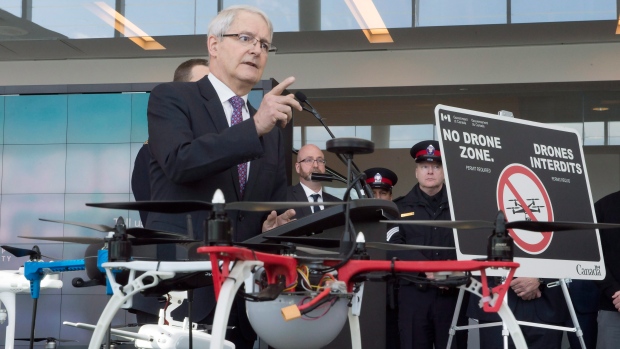If you’re a 911 operator in Canada, get ready for some overtime. Everyone’s favorite poster-child for over-regulation has arrived on the scene and wants to basically criminalize recreational drone use. Or ban it. Or both.
Transport Canada, the Federal ministry responsible for regulating all things that fly, float or roll, has enacted what may be the most limiting drone rules on Earth, outside of North Korea. We’re not kidding.
Effective immediately, these rules and guidelines are now part of the Criminal Code. Any infraction could see a fine up to $3000. In no particular order, recreational users could face a fine of up to $3000 if they are caught flying a drone weighing more than 250 grams:
- Higher than 90 meters (295 feet)
- Within 75 meters (250 feet) of buildings, vehicles, vessels, animals or people
- More than 500 meters(1/3 of a mile) away from the user
- At night, in clouds or somewhere you can’t see it.
- Within 9 km (5.5 miles) of “somewhere” aircraft take off or land or a forest fire.
- Without your name, address and phone number marked on the drone itself.
- Over forest fires, emergency response scenes or controlled airspace.
Okay. So they’re not all bad. We get the forest fires and controlled airspace. Many other jurisidictions have brought in the ‘not at night’ rule.
But here’s where the rule-loving bureaucracy has gone mad: no further than 500 meters? That’s the length of my driveway. Within 9 km of “somewhere” aircraft take off or land? First we want to understand the semantics of the language chosen. Transport Canada intentionally didn’t use the word “airport”. Instead they’ve broadened the reach of the regulations by saying “somewhere”. Does your local hospital have a heliport? That’s a somewhere. Does your county have a privately owned landing strip? That’s a somewhere.
To put it into perspective, we were about to pull Toronto on Google Maps to illustrate what impact the 9km rule has, but Twitter user @johnbowman beat us to it. Here’s what Canada’s largest city looks like if you want to fly a recreational drone, and the green circles do NOT mean “Go”.:

Even more disturbing is the recommendation by Transport Canada that citizens “call 911 if they see a drone regulation being broken”. Not only is the average human incapable of make accurate altitude and distance measurements on they fly in their brains, how can law enforcement reasonably expect to convict with a lack of physical evidence?
But the icing on the cake is the suggestion above to start clogging up life-saving 911 call centers with reports from your local do-gooders to report anything they see. What’s next: call 911 if you see someone riding a bicycle without a helmet? Should Torontonians start calling 911 if they see someone jay-walking on Yonge Street? Surely that is a more reasonable suggestion considering that between June and September 2016 over 540 pedestrians were hit by motorists in Toronto.
How many drone incidents were there during all of 2016? 148. It was not 148 Toronto, though. This statistic is the number of drone incidents reported in all of Canada during 2016. In case you failed Geography, Canada is the second largest country on earth by land area.
Already we are seeing blowback from consumers, and expect that drone and UAV retailers in Canada will partner with manufacturers like DJI to press for more reasonable modifications to these rules.
If you want further entertainment, check out the news report on Canada’s state-run media broadcaster , the CBC, and read the hundreds of comments appearing below the article here.

